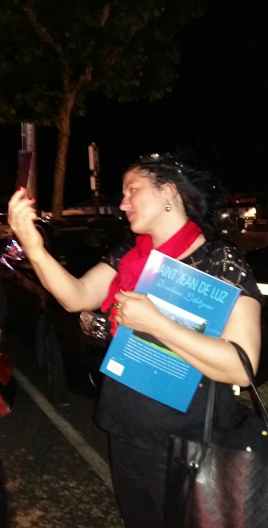 Comprendre les Peurs du Passé pour affronter les Peurs du Présent
Comprendre les Peurs du Passé pour affronter les Peurs du PrésentIntroduction about our reports to national agency and the risk to do divergent rellations of our activities.
Check first the schedule (right column)
What is a Goal (we have to "target" it) ?
According Ralph Tyler (1935),
we must ask to ourself 4 questions...
- What educational purposes should the school seek to attain? (Defining appropriate learning objectives.)
- How can learning experiences be selected which are likely to be useful in attaining these objectives? (Introducing useful learning experiences.)
- How can learning experiences be organized for effective instruction? (Organizing experiences to maximize their effect.)
- How can the effectiveness of learning experiences be evaluated? (Evaluating the process and revising the areas that were not effective.)
BUT
OBJECTIFS INTERMEDIAIRES
What is Taxonomy of Bloom ?
It is a well known set of three hierarchical models used to classify educatinal learnind objectives into levels of complexity and specificity.
The cognitive domain
(knowledge-based)
1 Remembering
Exhibit memory of learned materials by recalling facts, terms, basic concepts, and answers.
2 Understanding
Demonstrate understanding of facts and ideas by organizing, comparing, translating, interpreting, giving descriptions, and stating the main ideas (Translation, Interpretation Extrapolation).
Questions like: Compare the health benefits of eating apples vs. oranges.
3 Applying
Using acquired knowledge. Solve problems in new situations by applying acquired knowledge, facts, techniques and rules.
Questions like: Would apples prevent scurvy, a disease caused by a deficiency in vitamin C?
The third level of Taxonomy is application. Learners should be able to use information to solve problems, identify connections and relationships and how they apply. It is important for students to be able to use prior knowledge in new situations. For example, a student can be able to apply a method used to their own lives.
About
this three inferior levels,
no problem.
Debates do exist about the superior levels (following items) . For some of specialists, no hierarchy must be done between Analysing, Synthetising and Evaluating. Sometimes it is said Synthetizing is the last degree.
4 Analyzing
The next level of Bloom’s Taxonomy is analysis. Analysis is being able to break down information into component parts, and determining how the part relate to one another. An example of analysis is, having students summarize something and then students analyze why certain things happened
Examine and break information into parts by identifying motives or causes. Make inferences and find evidence to support generalizations
Questions
like: List four ways of serving foods made with apples and explain
which ones have the highest health benefits. Provide references to
support your statements.
5 Synthesizing
Builds a structure or pattern from diverse elements; it also refers the act of putting parts together to form a whole (Omari, 2006). Compile information together in a different way by combining elements in a new pattern or proposing alternative solutions
-
Production of a unique communication
-
Production of a plan, or proposed set of operations
-
Derivation of a set of abstract relations
Questions like: Convert an "unhealthy" recipe for apple pie to a "healthy" recipe by replacing your choice of ingredients. Explain the health benefits of using the ingredients you chose vs. the original ones.
6 Evaluating
Present and defend opinions by making judgments about information, validity of ideas or quality of work based on a set of criteria
-
Judgments in terms of internal evidence
-
Judgments in terms of external criteria
It does exist too an affective domain.... Emotional based domain : objectives typically target the awareness and growth in attitudes, emoton, feelings..
You have also skills in the psychomotor domain
(ability to physically manipulate a tool). Psychomotor objectives usually focus on change or developement in behavior (and/or skills)
WORKSHOPS' ABSTRACTS

to come back to the report
semble indispensable pour agir en cohérence.
Notamment pour rendre compte sans discordance de notre travail ,
mais également pour formuler
des consignes claires et assigner aux élèves - dans le cadre des mobilités par exemple - des missions congruentes avec nos attentes.
Il importe donc de bien distinguer nos buts (finalités du projet, remédiations souhaitées)
de nos objectifs (qui les traduisent concrétement) et de poser des objectifs intermédiaires
(posant et précisant les compétences à acquérir ou développer) et
des objectifs observables
(précisant quelles tâches évaluables devront être réalisées en fin de compte).
De même, les résultats attendus
(lesquels sont logiquement à l'origine de la définition de nos buts)
doivent être comparés aux résultats mesurés, donc à l'impact du
processus d'apprentissage ;
des procédures d'évaluation pertinentes sont donc nécessaires.
Ils mesureront l'avancement du projet à chaque étape
et l'impact final du Projet en fin de déroulement.
|
MANAGEMENT AND IMPLEMENTATION
AGENDA and Pedagogic Goals |
SCHEDULE TIME TABLE FOR FINANCIAL PHASIS |
SURVEY PERIODS FOR FOLLOW UP AND QUALITY CONTROL |
NBE + NUITS BLANCHES is an Erasmus+ 36 months long project funded by the European Union |
| FIRST PEDAGOGIC PHASIS during 1st year |
"Kick off" year 01/09/2015 - 31/08/2016 Studies about Dracula, Vampires, Witches, Creatures and Myths linked to the Night année de Lancement INITIAL Transnational Meeting R1 in Roma |
||
| C1 ROMA C2 RIGA FIRST REPORT BY THE COORDINATOR (before the 15th of september, 2016) rapport intermédiaire n°1 |
First financial phasis for our National Agency from september to july (advance of 40%) |
First Survey Period from October to March First Check Point : march, 2016 |
Second Survey Period from April to June Check Point 2 : june, 2016 MIDTERM Transnational Meeting R2 in Saint-Jean-de-Luz |
| FIRST PEDAGOGIC PHASIS during 2nd year |
01/09/2016- 15/02/2017 Studies about Transilvianan roots of legends and final productions about Mythologies First rewritings, and enlarged studies about (ancient) Fears conclusion des travaux sur Mythes et créatures de la Nuit (fin de l'inscription dans le eTwinning ILARGIA) |
||
| C3 CLUJ-NAPOCA SECOND REPORT BY THE COORDINATOR (before the 15th of march, 2017) rapport intermédiaire n°2 |
Second financial phasis for our National Agency from august 2016 to the 15th of february 2017 |
3rd Survey Period from july to november 4th Survey Period from december to february |
REBOOT Transnational Meeting R3 in RIGA |
| SECOND PEDAGOGIC PHASIS during second and third year |
15/02/2017 - 31/08/2018 Studies on fears of our time. Selection of rewritings and performances. Final Event and mutiplier event. VALORISATION Transnational Meeting R4 in CESME |
||
| C4 CESME C5 : FESTIVAL IN SAINT-JEAN-DE-LUZ LAST REPORT BY THE COORDINATOR (before the 31st of october, 2018) |
Third financial phasis for our National Agency from february to august 2017 (second advance of 40%) |
5th Survey Period from march to may 6th Survey Period from june to august |
final payment to complete the funds in october, 2018 |
Recommandations about mobility
organization :
INTEGRATION OF A
MOBILITY IN THE PROJECT
Goals must be accorded to Projects Goals
Impacts and results must be determined before
Participants must be selected (learning people)
Evaluation Tools must be prepared
The skills you want to enhance must be evaluated ex ante
Program conception :
Results description
Pedagogic methodology
Day by day schedule time table
External helpers
Budget
During the mobility :
make activities and collect witness
After the mobility :
Evaluation (to check if all goals were targeted)
Discuss to meliorate or to valorize
MAIN PORTAL * INTERNATIONAL COORDINATION
* STUDY TRAVELS * LOCAL ACTIVITIES * BLOG NBE+






